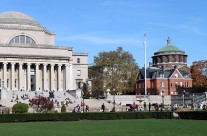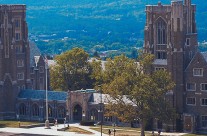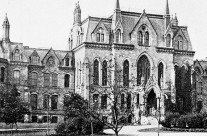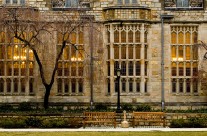
University of Pennsylvania
Posted in Ivy LeagueThe University of Pennsylvania (frequently called Penn) is a research university in Philadelphia, Pennsylvania. It is a member of the Ivy League, and was 1 of the 9 institutions founded before the American Revolution (known as the Colonial Colleges). It is the home of the first school of Medicine, the first student union, and the first collegiate business school in North America. It is consistently among the top five research universities in the United States.
History
Penn was the first university in the United States to offer both undergraduate and graduate studies, and is the fourth oldest higher education institution in the United States. It was founded by Benjamin Franklin. In 1749, Franklin created a vision for what he called a “Public Academy of Philadelphia”. He wanted a school that didn’t just focus on education for the clergy, but rather advocated an innovative concept of higher education, one which would teach the practical skills necessary for doing public service while still providing the ornamental knowledge of the arts. The Academy of Philadelphia accepted its first students on August 13th, 1751, and became known as the College of Philadelphia in 1755. Penn’s educational creations include the country’s first medical school in 1765 and teaching hospital in 1874, the world’s first business collegiate school (Wharton) in 1881, and the first student union building in America in 1896.
Programs
The Wharton School was established in 1881, and was the world’s first school of business. Today it is ranked as the 3rd best Business School in the country by U.S. News. The undergraduate program offers an innovative program that combines liberal arts and business. Students choose from more than 20 concentrations to specialize in a specific area of study. Major areas include Accounting, Finance, Marketing, and Statistics. The MBA Program offers more programs and courses than any other business school in the country. There are also Doctoral Programs in Accounting, Applied Economics, Finance, Marketing and Statistics. The Perelman School of Medicine is ranked by the U.S. News as the 4th best in Research and 13th best in Primary Care. It is the oldest medical school in the country, and has consistently been one of the best if not the best. It employs over 1900 full time faculty members, 725 medical students, and 753 Ph.D. students. Academic departments include Basic Science, which offers concentrations in Cancer Biology, Genetics, Pharmacology, and Physiology, and Clinical, which has specializations in Anesthesiology and Critical Care, Emergency Medicine, Neurosurgery, Pediatrics, Radiology, and Surgery. Penn’s School of Engineering and Applied Sciences, School of Education, and Law School also offer highly ranked graduate programs.

Pros & Cons
Penn ranks at the 8th best University in the country according to the U.S. News. It is a member of the Ivy League, and as such is on par with other institutions such as Columbia and Harvard, providing terrific education to both undergraduate and graduate students. It is located in Philadelphia, which provides students with plenty of activities and culture to experience outside of school. Penn also has terrific international opportunities, with more than 1700 students each year participating in international study programs. More than ¼ of the student body is involved in Greek life, which has approximately 45 fraternities and sororities. Penn is very selective, however. It had just a 12.4% acceptance rate in Fall 2011. It also has a high tuition ($43 738 per year) and room and board ($12 368), which forces almost half of the undergraduate population to receive financial aid.

 Brown University
Brown University Columbia University
Columbia University Cornell University
Cornell University Dartmouth University
Dartmouth University Harvard University
Harvard University Princeton University
Princeton University University of Pennsylvania
University of Pennsylvania Yale University
Yale University